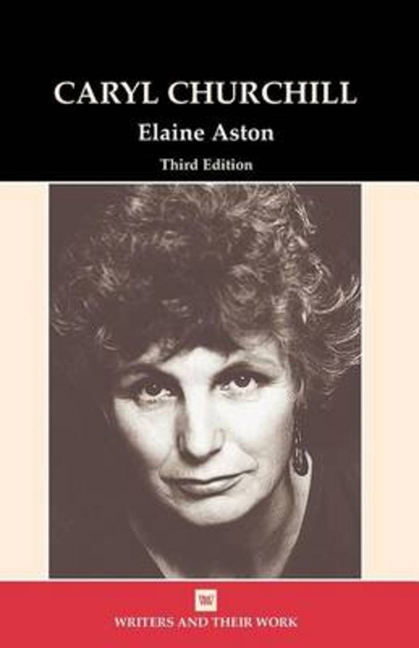Book contents
- Frontmatter
- Dedication
- Contents
- Acknowledgements
- Biographical Outline
- Abbreviations
- Preface
- Prologue
- 1 Beginnings: Radio, Stage and Television
- 2 The ‘Woman Writer’
- 3 The Dramatist as Socialist Critic
- 4 Communities in Dramatic Dialogue
- 5 Exploding Words and Worlds
- 6 1997 - Far Away
- 7 A Royal Court Celebration
- Notes
- Select Bibliography
- Index
3 - The Dramatist as Socialist Critic
- Frontmatter
- Dedication
- Contents
- Acknowledgements
- Biographical Outline
- Abbreviations
- Preface
- Prologue
- 1 Beginnings: Radio, Stage and Television
- 2 The ‘Woman Writer’
- 3 The Dramatist as Socialist Critic
- 4 Communities in Dramatic Dialogue
- 5 Exploding Words and Worlds
- 6 1997 - Far Away
- 7 A Royal Court Celebration
- Notes
- Select Bibliography
- Index
Summary
I think labels and terms like feminist writer or woman writer or leftwing writer vary very much … depending on who's using them and why… I think I only mind it in any sense at all - and mostly I would embrace it as being a reasonably accurate description - … if you think that in the other person's mind that conveys something very narrow or specific which doesn't really cover the breadth of your work, or that it conveys with it a stereotype of the kinds of things that they expect that you'll be writing.
Churchill has identified ‘two obsessions’ in her early work: one, which was the focus of the opening chapter, was concerned with ‘mental states, lovesickness, schizophrenia, and so on’, and the other was an ‘anticapitalist, state of England sort of thing, usually in a rather negative and sad mode’. The Ants, Churchill's first professional radio production (1962), described as ‘the most successful of these political plays’, illustrates this second obsession.
The Ants uses a familial setting to dramatize an estranged set of parents arguing over the custody of their son, Tim, who is temporarily staying with his grandfather until marital disharmony and living arrangements are resolved. As a refuge from parental quarrelling, Tim focuses on a community of ants, but as tempers flare he turns on the ants, and, finally, joins his grandfather in setting fire to them:
Pour a little petrol on them, that's right. Now we put the string here in the petrol and bring the end way over here so we can shelter from the blast all right? Down we crouch, then, oh. Now we light the string, here, see, light the string. [He strikes a match.] You take the match, you do it. That's right. Blow out the match. Now you wait, the string will burn all the way down to the enemy, see the little flame go all the way down to the ants.
The radio play ends with the directions ‘the petrol explodes into flame’ and Tim ‘shrieks with laughter’. Metaphorically, the burning of the ants is designed to express the horrors of war, and the ways in which people (Tim) can switch from identifying with a community of people (the ants) to bombing (setting fire to) them.
- Type
- Chapter
- Information
- Caryl Churchill , pp. 46 - 63Publisher: Liverpool University PressPrint publication year: 2010



